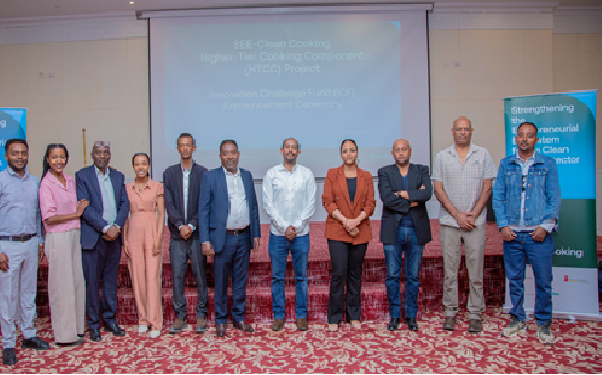EU Strengthens the Entrepreneurial Ecosystem for Higher Tier Clean Cooking in Ethiopia (HTCC)

Introduction:
|
The main objective of the EU co-funded project ‘Strengthening the Entrepreneurial Ecosystem for Clean Cooking – Higher Tier Cooking Component’ (HTCC) in Ethiopia is to accelerate the clean energy transition for all by promoting the growth of the local higher-tier clean cooking market. This ambitious project adopts an innovative, inclusive, and transformative market-based approach, positioning local entrepreneurs as pivotal agents of change to drive the transition from unsustainable traditional cooking practices to modern, clean, and affordable higher-tier cooking solutions. The project will notably provide tailored business coaching and access to finance to support local entrepreneurs, while also fostering a conducive enabling environment through partnerships with institutional stakeholders. Under this pilot project, an estimated 100,000 Ethiopian households will gain access to e-cook stoves and advanced biomass stoves. Objectives:Significant strides have been made towards achieving Sustainable Development Goal 7 on affordable and clean energy over the past decade, yet a staggering 4 billion people worldwide still lack access to clean and modern cooking fuels and technologies. The reliance on traditional biomass fuels and inefficient cookstoves has far-reaching consequences, including severe health issues, environmental degradation, contribution to climate change, and constrained economic development. In Ethiopia, over 96% of households use traditional biomass as primary cooking fuel, with a predominant reliance on firewood (82%). This not only perpetuates unsustainable practices but also disproportionately affects women in rural areas, who bear the burden of cooking and firewood collection. As a result, they are exposed to indoor air pollution, a heavy work burden, and an increased risk of gender-based violence. The Ethiopian cooking energy market is characterized by a dominance of low-tier technologies, with higher-tier solutions often failing to meet approved standards. Several barriers hinder the growth of the market for high-tier clean cooking solutions, including limited affordability and access to finance, a lack of awareness about technologies and related business models, restrictive policies, and inadequate market data and coordination between stakeholders. In response to the identified bottlenecks, the project is designed to drive transformative change in the clean cooking sector through a market-based approach that empowers local entrepreneurs and creates a conducive enabling environment. This is achieved by enhancing public-private coordination and leveraging the strengths of local stakeholders. Specifically, in this pilot phase, the project focuses on the following strategic objectives:
Improving the enabling environment: The project supports and fosters coordination between key public and private actors, including the Ministry of Water and Energy (MoWE), the Petroleum and Energy Authority (PEA), and the Ethiopian Clean Cooking Alliance (ECCA), to create a more conducive business environment that promotes the growth of the clean cooking sector. Project Activities:
|




